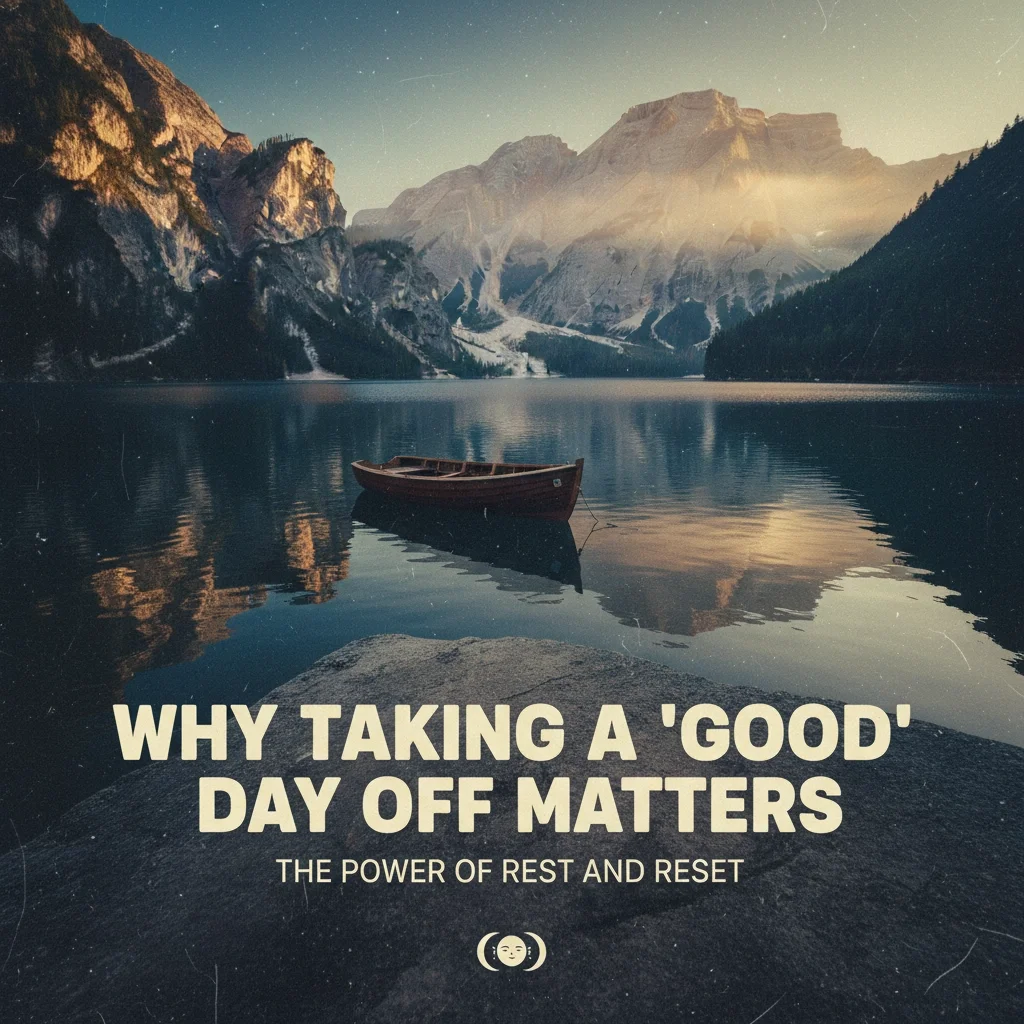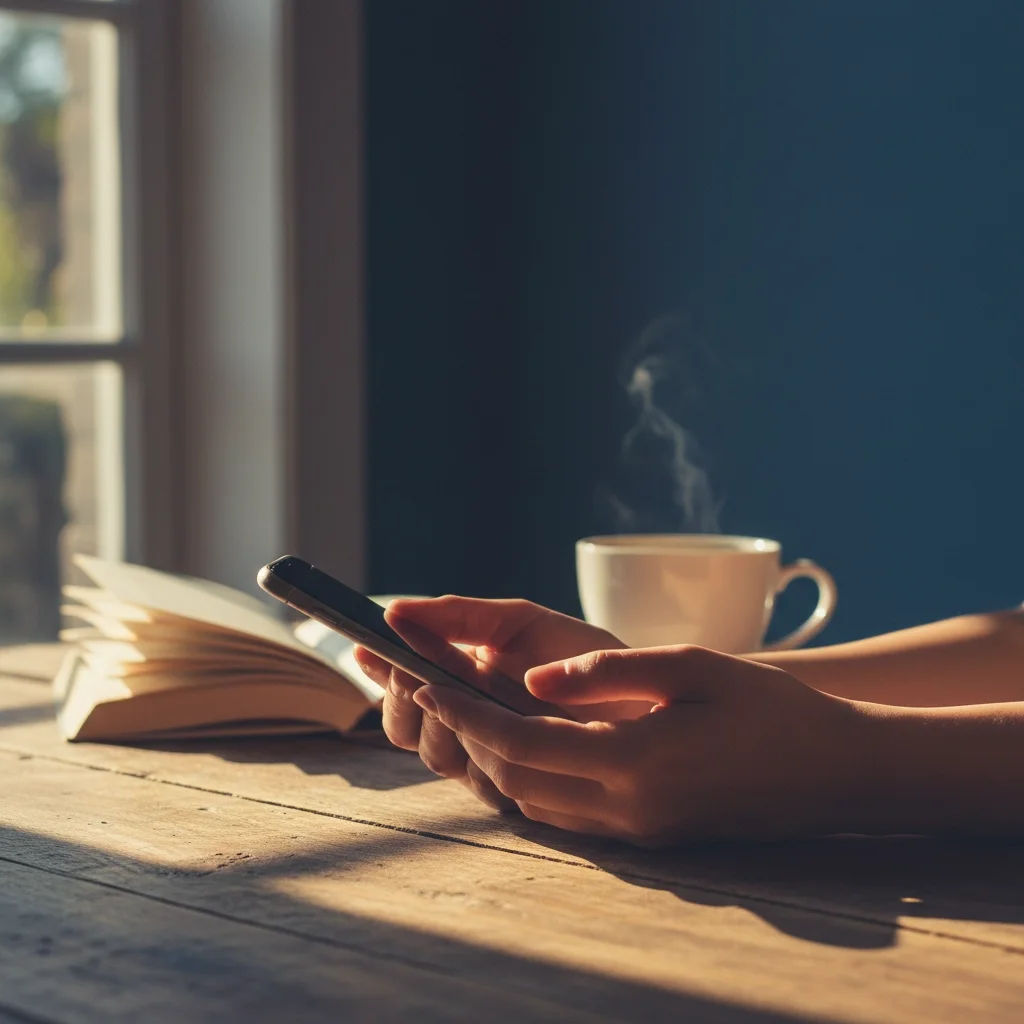Why Taking a 'Good' Day Off Matters: The Power of Rest and Reset
Let's be honest, when was the last time you took a day off that actually felt like a day off? You know, the kind where you didn't check emails "just once," didn't feel guilty about not being productive, and didn't spend half the day thinking about what was waiting for you tomorrow.
If you're scratching your head trying to remember, you're not alone. We've somehow convinced ourselves that being constantly available and perpetually busy equals success. But here's the thing: your brain, your body, and your future self are all quietly begging you to reconsider.
What Makes a Day Off Actually Good?
There's a world of difference between taking time off and taking a good day off. Simply being away from your desk while your mind races through tomorrow's to-do list isn't rest, it's just worry in a different location.
A good day off is one where you genuinely disconnect, reset, and remember that you're a whole person with interests, relationships, and needs beyond your job title. It's permission to be human rather than a productivity machine.
Think about it: when did we start believing that our worth was directly tied to our output? When did rest become something we had to earn rather than something we needed to maintain?
The Mental Health Reset You Didn't Know You Needed
Your brain is constantly processing, problem-solving, and managing the endless stream of decisions that make up your day. Without proper downtime, it's like running your laptop at full capacity 24/7, eventually, something's going to crash.
Taking a genuine day off allows your mind to shift into what psychologists call "diffuse mode." Instead of focusing intensely on specific tasks, your brain gets to wander, make new connections, and process experiences. This is where your best ideas often come from, not when you're grinding away at your desk, but when you're walking in nature, cooking a meal, or simply letting your thoughts drift.
The research backs this up: even short breaks of 3-4 days can significantly improve cognitive performance and reduce stress hormones like cortisol. When you give your mind permission to truly rest, you're not being lazy, you're being strategic about your mental health.
But here's what makes it even more powerful: a good day off helps you remember who you are beyond your professional identity. When did you last have a conversation that wasn't about work? When did you last do something purely because it brought you joy?
Your Body Is Keeping Score
While we're talking about mental benefits, let's not forget that your body is quietly documenting every skipped lunch, every late night, and every "I'll rest when this project is done" promise you've made to yourself.
Chronic stress doesn't just make you feel frazzled, it's actively working against your immune system, your sleep quality, and your overall health. Taking regular, genuine time off helps reset these systems and gives your body the chance to repair and recharge.
Think of yourself as an athlete. Even elite performers build rest days into their training because they understand that recovery is where the real growth happens. Your career isn't a sprint, it's a marathon, and marathoners who don't pace themselves don't finish strong.
The Productivity Paradox That Changes Everything
Here's where it gets interesting: taking time off actually makes you more productive when you return. I know, I know, it feels counterintuitive when you're staring at an overflowing inbox and a calendar that looks like a game of Tetris gone wrong.
But consider this: how many times have you worked on something while exhausted, only to realize later that you could have done it better (and faster) if you'd been properly rested? How many brilliant ideas have you missed because your mind was too cluttered to notice them?
When you're running on empty, you're not doing your best work, you're just doing more work. There's a difference, and it's costing you more than you realize.
Companies that understand this are already ahead of the curve. They've figured out that employees who take proper time off are more creative, make fewer mistakes, and approach challenges with fresh perspectives. They're not working more, they're working better.
Reconnecting with Life Beyond Your Job Description
One of the most profound gifts of a good day off is remembering that work is something you do, not something you are. When was the last time someone asked about your hobbies and you had an actual answer? When did you last feel excited about something that had nothing to do with your career?
Taking time off helps you maintain the relationships and interests that make life rich and meaningful. It's not selfish to spend time with loved ones, pursue a hobby, or simply enjoy a moment of quiet, it's essential.
At Three Chords Coaching, we see this holistic approach to self-management as fundamental to sustainable success. You can't separate your professional growth from your personal well-being because, ultimately, they're feeding the same person, you.
Making Rest Non-Negotiable
So how do you actually take a good day off in a world that seems designed to prevent it? Start by reframing rest as an investment rather than an indulgence. You wouldn't skip maintenance on your car and expect it to run forever, why would you treat yourself any differently?
Set boundaries that actually hold. This means turning off notifications, setting an out-of-office message, and resisting the urge to "just check in quickly." Trust me, the world will keep spinning without your immediate input.
Plan for nothing, but plan nonetheless. Having a loose structure for your day off prevents you from falling into the trap of mindless scrolling or feeling guilty about "wasting" time. Maybe it's a walk in the morning, a book in the afternoon, and dinner with someone you care about. Simple, but intentional.
Practice saying no to the voice that tells you rest is earned. Rest isn't a reward for productivity: it's a requirement for sustainability. You don't have to justify taking care of yourself.
The Ripple Effect of Real Rest
When you take genuine time off, the benefits don't stop with you. You return to work with more patience, creativity, and energy. You're a better colleague, friend, and family member. You make clearer decisions and approach challenges with a fresher perspective.
More importantly, you model healthy behavior for others. In a culture that's drowning in hustle mentality, choosing rest is actually a radical act of leadership.
Your future self will thank you for the boundaries you set today. The project that feels urgent right now will be forgotten in six months, but the habits you build around self-care will serve you for life.
Your Next Step
Taking a good day off isn't about being lazy: it's about being intentional with your energy and strategic about your well-being. It's about understanding that sustainable success requires sustainable practices.
If you're struggling to give yourself permission to rest, or if you're not sure how to create better work-life integration, you don't have to figure it out alone. At Three Chords Coaching, we help people build holistic approaches to career management that honor both professional growth and personal well-being.
Because here's the truth: you're not just building a career: you're building a life. And a life worth living includes regular moments of rest, reset, and genuine connection with what matters most to you.
When's the last time you took a day off that left you feeling genuinely refreshed? If you can't remember, maybe it's time to plan one. Your mind, your body, and your future self are all waiting for you to give yourself permission to rest.
Ready to start building better boundaries and sustainable success practices? Let's talk about how to make self-management a cornerstone of your career journey.





